Nine Doors, The Easier To Run Away
A coworker told us that we can find old Beijing food in a food street set in a traditional courtyard called "Jiu Men Xiao Chi" (九门小吃). Since our aim in Beijing is to eat, live, tour Beijing, we took note and paid a visit. I couldn't see how different old Beijing food can differ from the current anyway so with an empty stomach, we set forth.
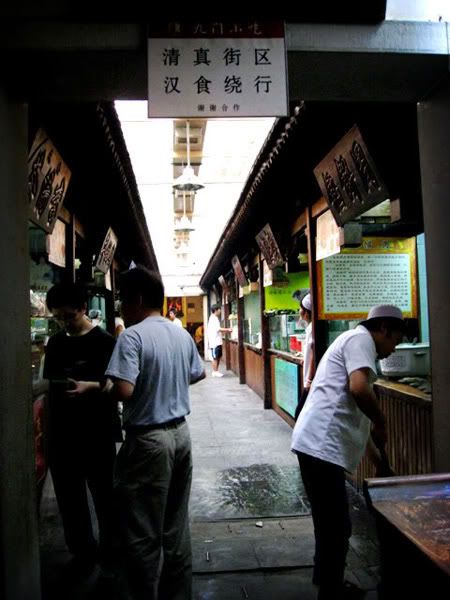 Entrance of the "Jiu Men Xiao Chi" literally translated as "Nine Doors Small Eats"What an interesting name
Entrance of the "Jiu Men Xiao Chi" literally translated as "Nine Doors Small Eats"What an interesting name, I thought. I wondered if there were nine doors to the eatery. It was quite a small street consisting of no more than ten stalls. Business was sparse but I attributed it to the fact that we might have been too early.
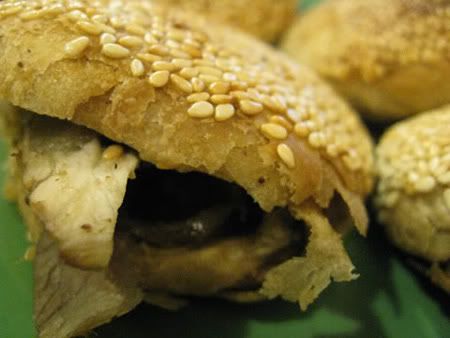 "Da Lian Huo Shao" (褡裢火烧), a sort of beef meat pie wrapped by fried sesame crusts
"Da Lian Huo Shao" (褡裢火烧), a sort of beef meat pie wrapped by fried sesame crusts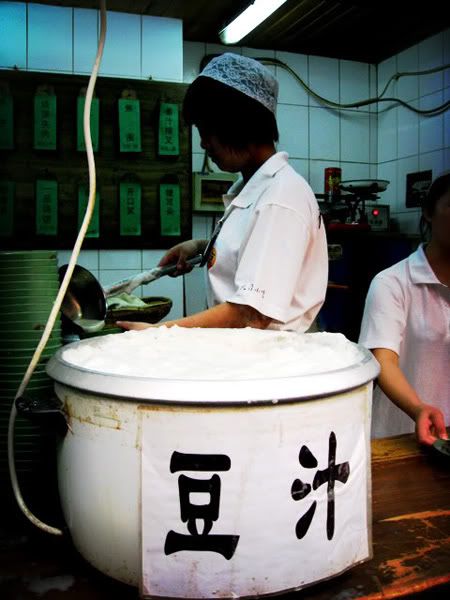 Mung Bean Milk or "Dou Zhi" (豆汁), a favourite drink of the old Beijing folks
Mung Bean Milk or "Dou Zhi" (豆汁), a favourite drink of the old Beijing folks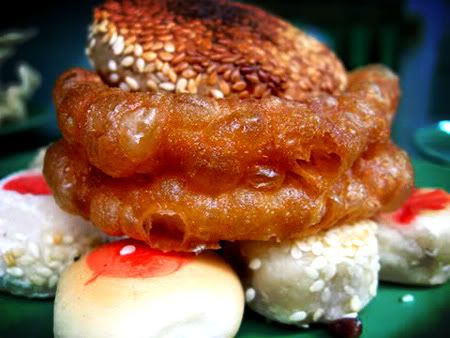 I have no idea what this is but for what's it's worth, it looks like the sesame crust coiled around by a fried doughstick atop of flaky pastries.
I have no idea what this is but for what's it's worth, it looks like the sesame crust coiled around by a fried doughstick atop of flaky pastries.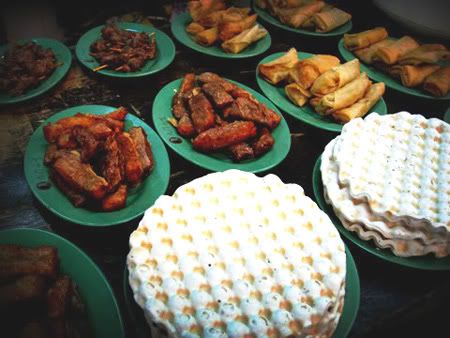 An array of dubious fried food and cardboard-like crusts. Like the eggs placer.
An array of dubious fried food and cardboard-like crusts. Like the eggs placer.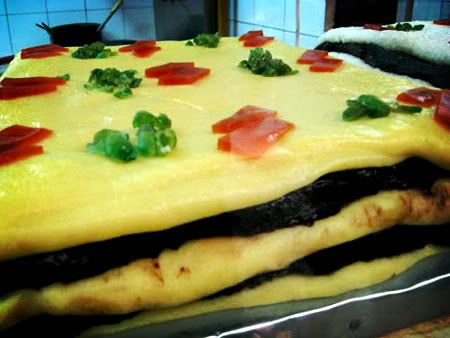 Year cake or "Nian Gao" (年糕). This one looks soft and chewy though.
Year cake or "Nian Gao" (年糕). This one looks soft and chewy though.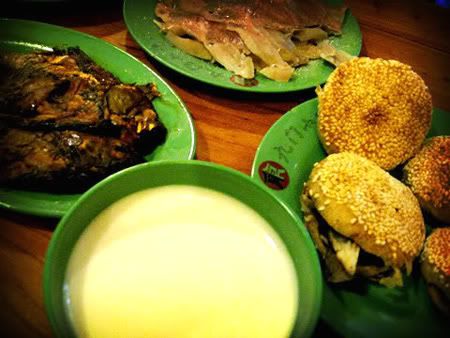 Our first breakfast in Beijing. Well-anticipated but less than well-received. From top left: fish in soy sauce, shaved goat's head meat (yes you heard right), beef meat pie and goat's milk.
Our first breakfast in Beijing. Well-anticipated but less than well-received. From top left: fish in soy sauce, shaved goat's head meat (yes you heard right), beef meat pie and goat's milk.Unfortunately I think whoever recommended this place to Eileen and I had it bad for us. It was a strange and awkward meal with many a deliberate chewing and occasional
hurummmms of uncertainty. Eileen watched a Taiwanese food show and excitedly ordered shaved goat's head meat on impulse (or so I would like to believe). The stall owner lifted a decapitated goat's head onto his chopping board and started shaving pieces of meat off its ears. Its very dead eyes were boring into mine.
I'll never touch it, I declared but all the same, I was
coerced into trying and I swear I'll never eat it again. It was cold, crunchy, salty and had a strong smell to it. In fact, all the food were cold and seemed like leftovers. The best of the lot had to be the meat pies since the sesame crusts were warm and vaguely gave a semblance of normality. We left most of our food untouched which was a real pity but we just could not stomach it.
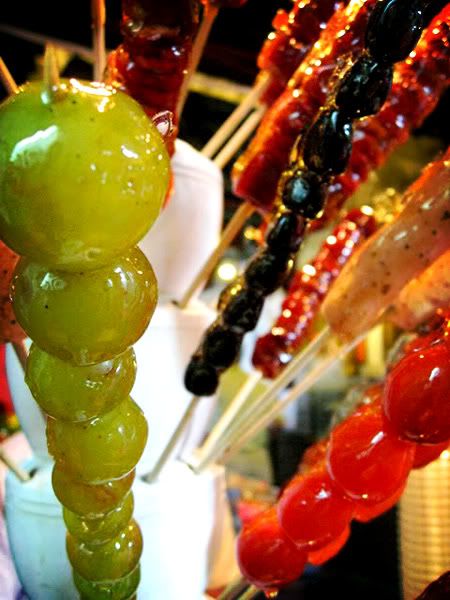 Candied haw/fruits in sticks or "Bing Tang Hu Lu" (糖葫芦). I tried the candied peaches and the flavours and the juice were wonderfully retained, sending you into a sugary high.
Candied haw/fruits in sticks or "Bing Tang Hu Lu" (糖葫芦). I tried the candied peaches and the flavours and the juice were wonderfully retained, sending you into a sugary high.To conclude, old Beijing food has been around from the olden days and they are worth a try just because they gave us the idea what people used to eat and this is from my most diplomatic point of view.
"Nine Doors Small Eats" does need the nine doors ... for me to run away from in a hurry!
Labels: Beijing, China, Food, Gastronomy, Jiu Men Xiao Chi, Travel, Wanderlust

Quack Up A Storm!
北京前门全聚德烤鸭店The moment we touched down in Beijing, our first dinner thoughts reached out to Peking ducks. How could we not, when we flew this far to attest flattering reports of crispy duck skin and tender, juicy meat? A friendly chat with the local cab driver sent us to the Quan Ju De's (全聚德烤鸭店) multi-leveled outlet in He Ping Men (和平门) which he said is the most authentic and delicious of all outlets.
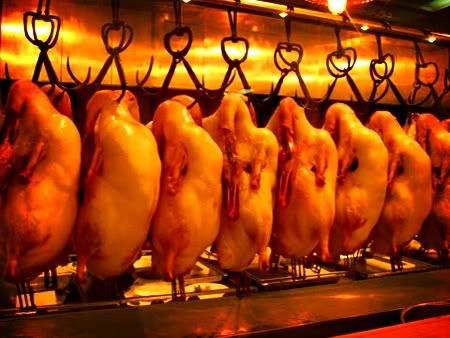 A welcoming sight of rows of ducks still in their birthday suits greeting us
A welcoming sight of rows of ducks still in their birthday suits greeting usThe restaurant was run in absolute efficiency as they quickly ushered you through the levels by use of walkie-talkies to ensure that you have a seat. The ducks were roasted with non-smoky hardwood fuel such as peach and pear to give its subtle fruity flavour.
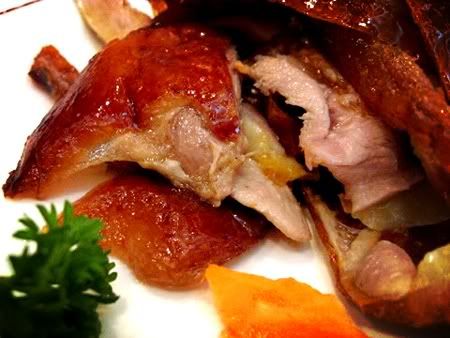 We were well rewarded for our six hours flight when we took an initial, crunchy bite. It tasted of heaven.
We were well rewarded for our six hours flight when we took an initial, crunchy bite. It tasted of heaven.The helpful waiters/waitresses also stopped by each and every table to explain the history of the very duck being violated and demonstrated with ease on how to make a roll with the use of just a pair of chopsticks but in the end, I gave up, the process was too time-consuming.
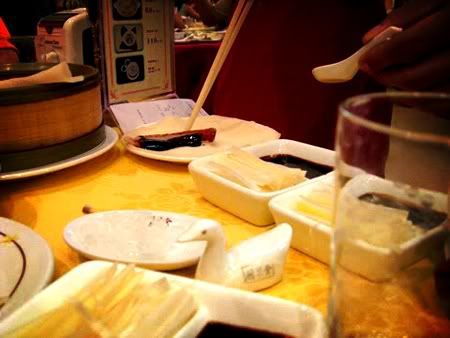 They were efficient with the chopsticks while I was still living in stone age where my hands are my chopsticks but what's the fuss? The duck is still well-appreciated!
They were efficient with the chopsticks while I was still living in stone age where my hands are my chopsticks but what's the fuss? The duck is still well-appreciated!It was very gratifying to sink my teeth into such succulent meat after a flight of anticipation but I have to say that after your basic craving is satisfied and the need for duck goes away with every bite, my marginal utility level dipped. It was too oily to be consumed in great quantities. Nevertheless, visitors to Beijing should definitely put this on their agenda to try at least once. I would advise that no one gets too over zealous since almost every single dish on the menu has something to do with ducks. You end up getting duck rice, duck noodles, duck meat soup and vegetables fried with duck and it could be very disorienting.
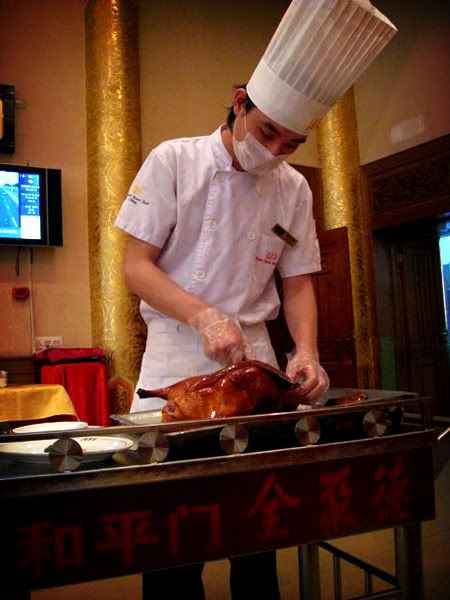 The surgeon and the duck in which there was no hope of survival under the blade.
The surgeon and the duck in which there was no hope of survival under the blade.地址/Address:
北京前门全聚德烤鸭店 Beijing Qian Men Quan Ju De Kao Ya Dian
北京市崇文区前门大街32号 Bejing Chong Wen Men Qu Qian Men Da Jie 32 Hao
电话:01067011379
老北京炸酱面大王One of our very last meals in Beijing, we decided to end it with a duck note. "
I come for duck, I leave with duck" was my skewed mentality at that time. After a full one day tour at the Great Wall, the
Ning tombs and the Temple of Heaven, the cab driver (we ingratiated well with cab drivers during our trip, they withhold a wealth of culinary information!) made a recommendation that we try out Lao Beijing Zha Jiang Mian (老北京炸酱面) which is translated to "Old Beijing Minced Meat Noodles".
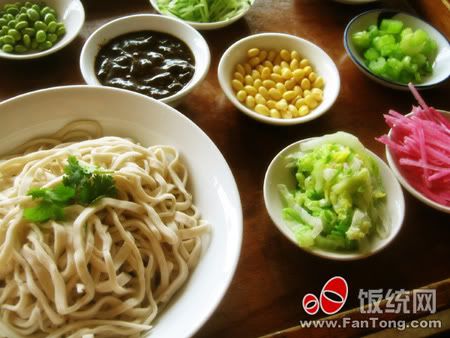 Image taken from Fan Tong
Image taken from Fan TongYou are served with a plate of plain, unadorned noodles with an array of sides that you could choose to mix your noodles with to customize your favourite way of eating
Zhang Jiang Mian. The dark sauce ii the picture is yellow soybean paste which is very salty so please go sparing on it. The pink strips are ginger slices and the greens are chopped celery and cabbages and there are also different kinds of beans. In Singapore, you can also find
Zhang Jiang Mian in some of the handmade noodles stall in hawker centres or food courts and even Crystal Jade La Mian restaurants. However, mostly the local
Zhang Jiang Mian are only topped with minced meat and thinly sliced cucumber strips.
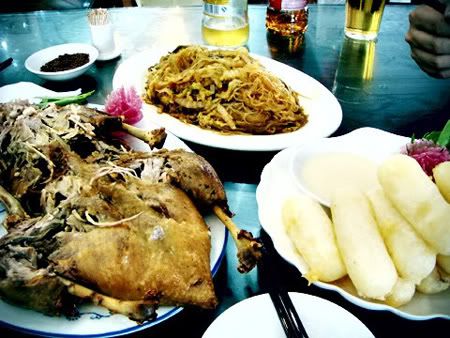 A deep-fried crispy duck with tender meat on the left. Preserved vegetables fried with glass noodles on the top and soft deep-fried milk desserts on the right.
A deep-fried crispy duck with tender meat on the left. Preserved vegetables fried with glass noodles on the top and soft deep-fried milk desserts on the right.I apologize for the desecrated duck since we tucked into it way before recalling we needed a picture. The duck turned out ugly but had the most crispy skin and tender meat. Never judge a duck by its outlook. It was not oily at all, a little bit on the dry side but you could eat the whole duck without feeling inundated. The deep fried desserts were very soft, sinking your teeth right through the milky goodness. I imagine them to be very popular with toothless old folks.
I likened
Zha Jiang Mian to be a form of Chinese Bolognaise pasta (only in Beijing, there's no minced meat in the minced meat noodles). I didn't like mine as much as I like the Singaporean form. The yellow soybean paste was too salty for my liking but those who have an affinity to trying pasta worldwide should consider giving this a go.
地址/Address:
老北京炸酱面大王 Lao Bei Jing Zha Jiang Mian Da Wang
崇文区 崇文门外大街29号 Chong Wen Qu ChongWenMen WaiDaJie 29 Hao
Labels: Beijing, China, Duck, Food, Gastronomy, Lao Beijing Zha Jiang Mian, Peking, Quan Ju De, Travel, Wanderlust

The Nu Toilet Revolution (Pre-Olympics)
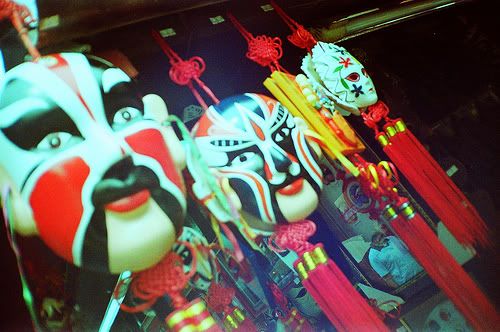 Photo is credited to a random search in Google, bringing up nostyle's flickr image.
Photo is credited to a random search in Google, bringing up nostyle's flickr image.One week in Beijing and I feel like the proverbial local. It was a good trip, as any vacation that does not involve work should be but as always, there were highlights and downsides to them. I'll probably blog about the Beijing trip in segments since there are many stories to tell and history to relate and part 1 would talk about the infamous sanitary conditions of the city's toilets.
I visited Beijing 12 years ago on the school's Chinese Orchestra tour (how cool is that! I forgot I used to be vaguely musically inclined) and Beijing has had some quite horrifying toilet stories which I can attest for. The toilets then were all squatters and most had no doors. You will be lucky if there are any partitions at all in between you and your neighbours. Even if there is, the walls separating each "cubicle" were only waist-level high so you can choose to converse with your neighbours if you so wish or exhibit disturbing voyeuristic tendency. There was no proper flushing system so most of the time you find yourself hovering over a nauseatingly deep pit which contained the "essence" of your predecessors. However, ever since the right to host Olympics 2008 had been awarded to the city of Beijing, the Chinese government took the honour very seriously and launched a campaign to renovate all public toilets to "acceptable" levels. You can be sure that the 57 million
yuan investment did not go down the hill. Almost all the toilets at conspicuous places e.g. shopping centres and places of interest are now clean and dry. There is still some room for improvement to reach the level of comfort I am used to in Singapore but going to a public toilet in Beijing is no longer a sensory war or as what I call it, a "mind-over-body" experience.
Most public toilets do have doors and their partitions now reach well over my head, covering me totally. If you plan on making some cursory toilet visits in Beijing just to say you've been there and done that, please do still bring your own stash of toilet paper. The toilet paper dispenser is located in a central location but generally unavailable in each and every cubicle and they do run out. There is still a very unfair proportion of squatters over the seated toilets since the Chinese prefer the squatters for hygiene purposes (they prefer minimal body contact) so be prepared to roll up your trousers or wear skirts for that matter. Oh and though there are now doors, some of the Beijing's citizens are still accustomed to the open concept. My travel partner, Eileen saw two women squatting in their half-naked glory with doors wide open, texting away on their mobile phones and came out of the toilet, reeled in shock. So what does it say? The purpose of having doors is lost on those who are used to the ways of the past.
A short excerpt from an article about Beijing's toilets before the upscale which I found quite amusing:
Zhou said that what tourists objected to can be described in four words: “smell” (tourists said they could find a toilet by its smell); “jump” (once inside they jumped to avoid stepping on residue left by previous occupants), “weep” (they wept when they squatted down and could see maggots in the pit below) and “smile” (when they looked up they smiled in embarrassment when they found they were not alone but with many other people who were staring at each other face-to-face.)My misplaced sense of humour and savvy geekiness sometimes led to interesting finds such as
The Bathroom Diaries which was described by the creator as "a world in which menus of restrooms were posted in the window along with the bill of fare". Very innovative and I have to agree that one shouldn't expose our tender bits to un-reviewed and uncharted zones in which we are not duly informed.
Labels: Bathrooms, Beijing, China, Horror, Restrooms, Toilets, Travel, Wanderlust
































